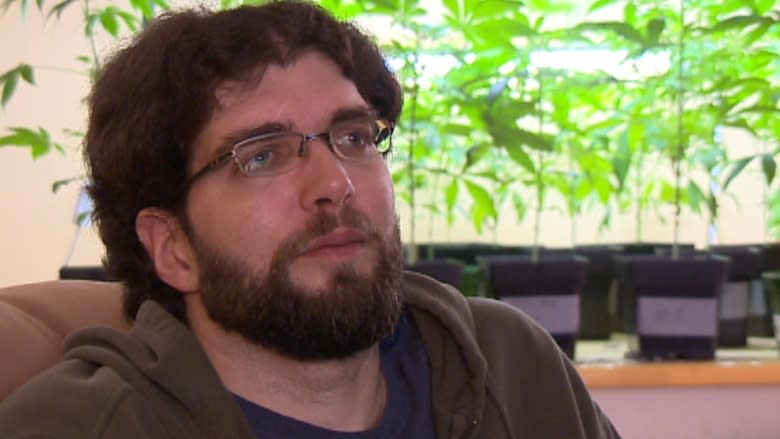In the weeds: A conversation with a marijuana grower
The first thing that struck me about Mike Dawe when I met him about a year and a half ago was how tall and slim he is, how long and slender his fingers are, and how his big shoes suggest equally long and slender toes.
To anybody familiar with his chronic condition, all that comes as no surprise.
Marfan syndrome is a genetic disorder of the connective tissue which afflicts those who have it with debilitating symptoms too numerous to list here. Long limbs are a prominent part of the syndrome's profile. So are pain and insomnia.
It would be totally understandable if Dawe went even slightly out of his way to dramatize his situation. He doesn't, and that's the other striking thing about him, his engaging thoughtfulness.
So when he says, "We're basically being thrown to the wind," it's worth listening to what he has to say.
Averts other medical interventions
Dawe has been growing his own medical marijuana for seven years. It numbs his pain, helps him sleep, keeps him off addictive opioids, and averts other medical interventions he doesn't want to contemplate, such as the once-suggested implant of a spinal electrode to modify pain signals to his brain.
He invited me to his home to show me what he stood to lose with the new federal government policy that makes it illegal for him to keep growing his own medicine.
He had about a dozen plants going under a grow light in his living room. They were still quite young, standing about two feet tall with delicate, feathery leaves. There were two varieties — Super Silver Haze and Nigerian. I couldn't tell the difference, but he assured me there was.
His real grow-op was in his basement. The floor was littered with the pale skeletons of at least two dozen plants, recent victims of powdery mildew, the pot grower's bane.
As he stood over them like a farmer who's seen his crop ravaged by disaster, I began to appreciate how much growing the ancient medicinal herb so reviled by modern policy makers means to this this lanky, 34-year-old former botany student.
Calling the shots for his own treatment
First and foremost, it allows him to call the shots on his own treatment. He knows what varieties of marijuana work for him, which ones keep him going during the day and which wind him down at night. He's in control.
But just as importantly he's part of a larger community of medical marijuana growers across Canada and the United States.
He says they're not the abusers the Canadian government says it's targeting with its change of policy, but law-abiding citizens who find themselves in the difficult situation where the medicine that works for them is also an illegal substance.
Under the new policy, all medical marijuana in this country must be grown by licensed commercial producers, of which there are 25 by now. The policy went into effect one year ago.
According to the on-line medical education provider mdBriefCase, the transition from the old to the new system hasn't been smooth. "Many people are experiencing long wait times to receive their orders, due to stock shortages at certain producers."
More pertinent to people like Dawe are quality and cost.
Dawe says even the top commercial product currently available doesn't come close to what he's been growing. What's more, commercial prices are completely out of his reach.
He says the cost of growing what he needs to make his life bearable runs from $300 to $400 a month. The price for a commercial product of the quality he'd be looking for is about $15 a gram, which for him translates into roughly $10,000 a month. That's simply not in his budget.
Luckily, Dawe and other growers of medical marijuana like him got a temporary break. The new policy has been challenged in federal court. Until the case has been ruled on, the policy is on hold.
Decision expected in a few months
The case got underway this year in late February. Final arguments were heard in mid-March. A decision is expected in August or September.
Dawe followed the case closely but won't even attempt to guess which way it will go. "So much is involved," he says. "It's hard to say."
What he is willing to say and has said before is that the new policy fails the very people it's supposed to benefit.
The government benefits by privatizing a service it was never comfortable with or good at in the first place — the production and distribution of medical marijuana.
The private sector stands to launch a new, multi-million-dollar industry as the demand for medical marijuana keeps growing.
Those who actually need the product lose any control over how they get it except as consumers of a new industry that may take years to sort itself out and its priorities.
"It's a complete and total screw job to the patients," says Dawe.




